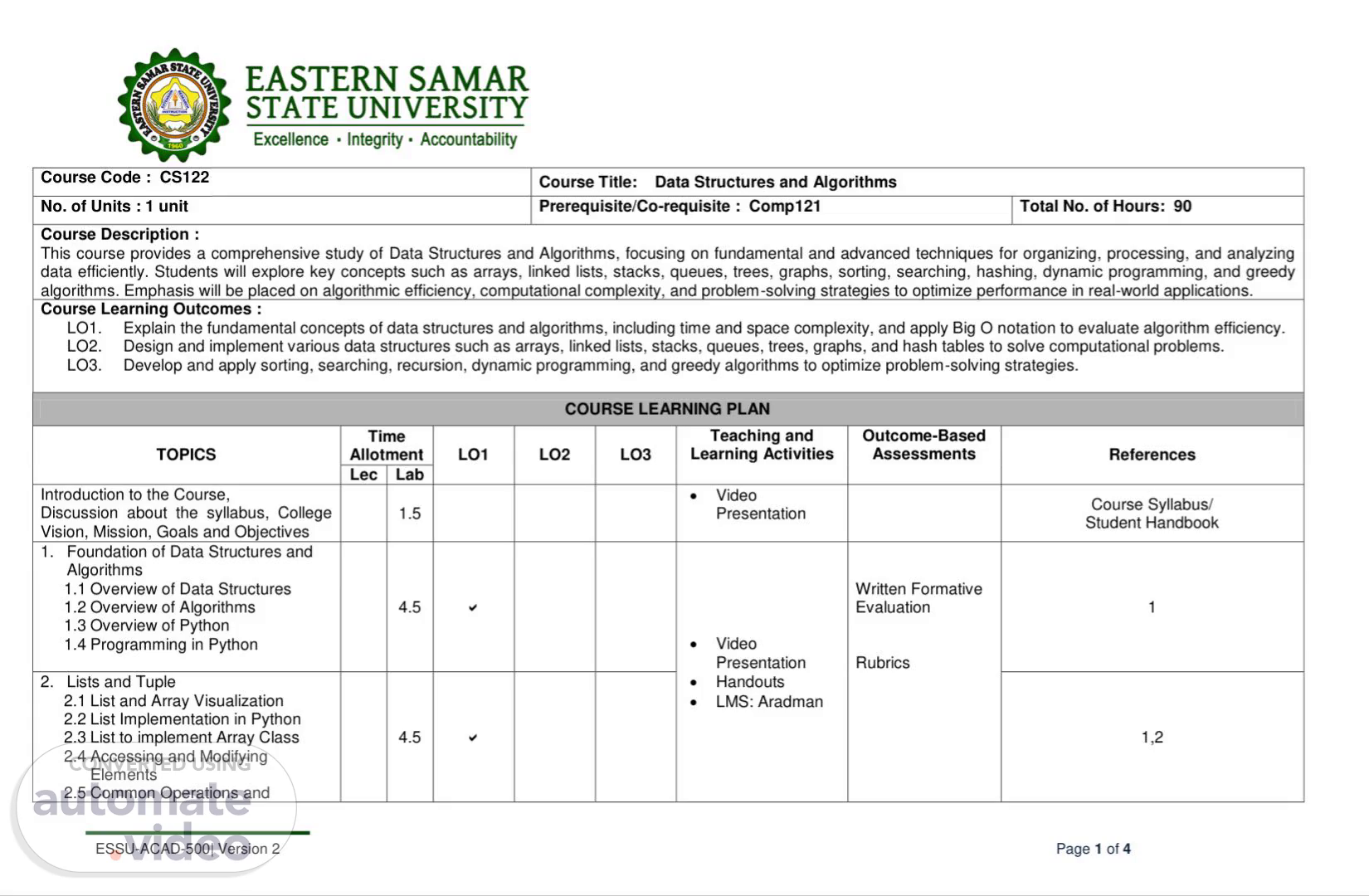Scene 1 (0s)
ESSU-ACAD-500| Version 2 Page 1 of 4 Course Code : CS122 Course Title: Data Structures and Algorithms No. of Units : 1 unit Prerequisite/Co-requisite : Comp121 Total No. of Hours: 90 Course Description : This course provides a comprehensive study of Data Structures and Algorithms, focusing on fundamental and advanced techniques for organizing, processing, and analyzing data efficiently. Students will explore key concepts such as arrays, linked lists, stacks, queues, trees, graphs, sorting, searching, hashing, dynamic programming, and greedy algorithms. Emphasis will be placed on algorithmic efficiency, computational complexity, and problem-solving strategies to optimize performance in real-world applications. Course Learning Outcomes : LO1. Explain the fundamental concepts of data structures and algorithms, including time and space complexity, and apply Big O notation to evaluate algorithm efficiency. LO2. Design and implement various data structures such as arrays, linked lists, stacks, queues, trees, graphs, and hash tables to solve computational problems. LO3. Develop and apply sorting, searching, recursion, dynamic programming, and greedy algorithms to optimize problem-solving strategies. COURSE LEARNING PLAN TOPICS Time Allotment LO1 LO2 LO3 Teaching and Learning Activities Outcome-Based Assessments References Lec Lab Introduction to the Course, Discussion about the syllabus, College Vision, Mission, Goals and Objectives 1.5 Video Presentation Course Syllabus/ Student Handbook 1. Foundation of Data Structures and Algorithms 1.1 Overview of Data Structures 1.2 Overview of Algorithms 1.3 Overview of Python 1.4 Programming in Python 4.5 Video Presentation Handouts LMS: Aradman Written Formative Evaluation Rubrics 1 2. Lists and Tuple 2.1 List and Array Visualization 2.2 List Implementation in Python 2.3 List to implement Array Class 2.4 Accessing and Modifying Elements 2.5 Common Operations and 4.5 1,2.
Scene 2 (1m 5s)
[Audio] Iteration and comprehension are crucial concepts in programming, enabling efficient manipulation and processing of data. Iteration refers to the repetition of a process or operation multiple times, while comprehension involves understanding and interpreting data. We will examine how these methods can be applied to various tasks..
Scene 3 (1m 25s)
[Audio] Sorting algorithms are essential tools for arranging data in a specific order. The concept of sorting involves rearranging data in a particular manner, which is crucial in various applications. There are different types of sorting algorithms, including bubble sort, selection sort, insertion sort, merge sort, quicksort, and heapsort. These algorithms vary in their efficiency, complexity, and applicability. Advanced sorting techniques in Python include the use of built-in functions like sorted() and list.sort(), which can simplify the process of sorting data. Understanding the importance of sorting in various applications and analyzing its complexities is vital for developing efficient sorting solutions for real-world problems..
Scene 4 (2m 10s)
[Audio] The references provided demonstrate the extensive scope of knowledge in the field of data structures and algorithms. The list comprises a diverse array of texts, ranging from introductory materials such as "Data Structures and Algorithms in Python" by Canning, Broder, and Lafore, to more advanced resources like "Algorithms" by Dasgupta, Papadimitriou, and Vazirani. The inclusion of texts focused on specific programming languages, such as Python and Java, underscores the significance of language-specific considerations in data structures and algorithms. Moreover, the presence of texts covering algorithm design, problem-solving, and algorithmic thinking illustrates the multidimensional nature of this field..
